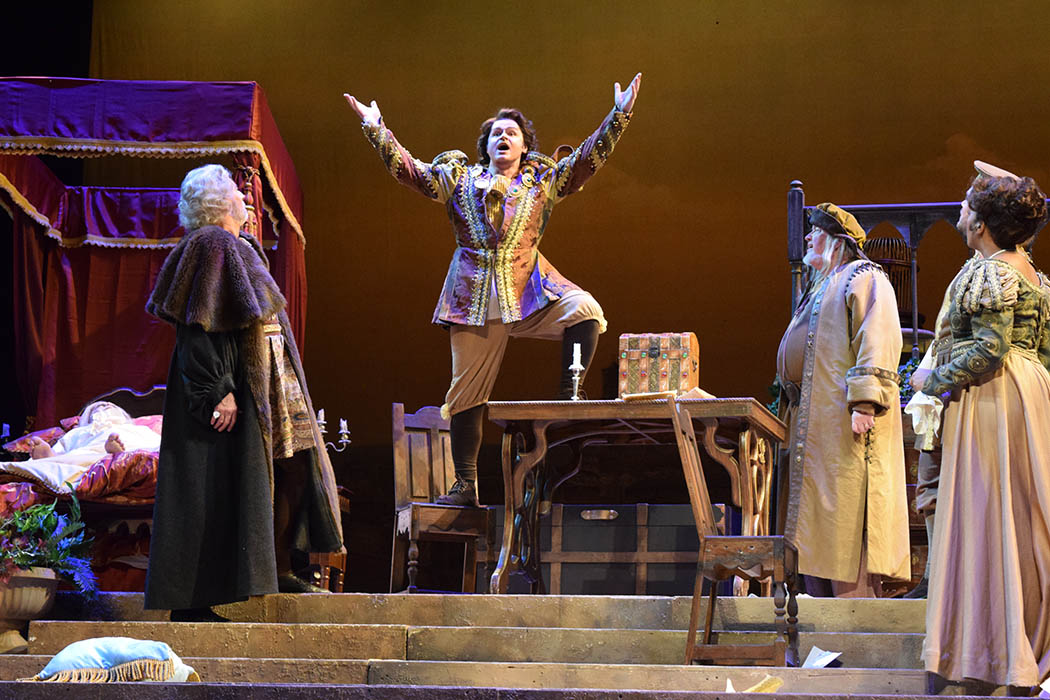There are a lot of myths surrounding the life of Wolfgang Amadeus Mozart, but one thing that we know for certain is that he absolutely loved a good joke—particularly if it ridiculed or parodied those in the musical/theatrical world. A perfect example of this parody can be found in his one-act singspiel The Impresario (Der Schauspieldirektor) from 1786, commissioned by Emperor Joseph II and subtitled appropriately “Komödie mit Musik.” The original libretto by Gottfried Stephanie revolved around an opera impresario charged with forming a new company in Salzburg, two sopranos quarreling with each other over roles and money, and a tenor who tries to settle their feud. For the piece, Mozart wrote an overture, two soprano arias, a trio, and a quartet.
As delightful as Mozart’s music is, most modern productions of The Impresario rewrite the libretto using contemporary references—and this is where Knoxville Opera enters the picture with its season-opening comedy double bill: Mozart’s The Impresario and Puccini’s one-act comedy, Gianni Schicchi.
“I’d always wanted to do Gianni Schicchi,” explains Knoxville Opera general director Brian Salesky, “But the cost is just prohibitive if you go and do the whole trilogy, Il Trittico, of which it is a part. Since Gianni Schicchi was really only the part that I wanted to do, I thought as opposed to pairing it with a serious opera, which is what is traditionally done, let’s just have some fun here.”
Channeling Mozart’s sense of humor and love of parody, Salesky has completely rewritten the libretto to The Impresario, placing the joke squarely on the shoulders of himself and Knoxville Opera. And, he has formulated a comic connection to the ensuing Gianni Schicchi.
“I’m doing what Mozart did,” says Salesky, “… making fun of opera singers and opera directors. So, our whole story of The Impresario is about a guy producing Gianni Schicchi for Knoxville Opera. The audience will be in for a ton of inside jokes and backstage shenanigans.”
“The setup is that when the audience walks into the Tennessee Theatre, the curtain is up and the production of Gianni Schicchi is being prepped and assembled onstage. During the overture, the impresario will be sitting there on stage working on his paperwork and then we go right into the play. During the course of the play, there is the Mozart music that was written for it and we’ve interpolated two additional arias as a little surprise for the audience.”
Salesky explains how the comedy is in the connection. “Our Impresario only has four characters and all four characters play roles in Gianni Schicchi. You’ve got the Impresario, two sopranos, and this know-it-all has-been Italian tenor who has been called in to be the artistic director because the Impresario has cast himself in two roles.”
And, after intermission, the product of all this Mozartian comic setup: Giacomo Puccini’s masterpiece Gianni Schicchi.

Written as one part of Il trittico (The Tryptych), Gianni Schicchi was based on a briefly mentioned event in Dante’s Divine Comedy and is set in the Florence of 1299. The plot revolves around a family that has gathered around the deathbed of one of its patriarchs, Buoso Donati, hoping to discover that they have been rewarded in the old man’s will. As they eventually read the will, they learn the worst—that the old man has left everything to a monastery. A clever local merchant, Gianni Schicchi, is engaged to devise a plan to overcome this tragedy. Schicchi suggests that he impersonate the now-deceased man and dictate a new will with terms that favor the relatives. What ensues is one of the most delicious double-crosses in all of literature and theatre.
In many ways, Gianni Schicchi confirmed a change in Puccini’s musical sensibilities that had been hinted at as early as La fanciulla del West (The Girl of the Golden West) from 1910. By 1918, the year of Gianni Schicchi’s premiere, the war that had gripped Europe was over, but much had changed, musically as well as socio-politically. Puccini’s opera represents a decided advance in tonalities, orchestral harmonies, and theatrical effects that are an integral part of the storytelling in Gianni Schicchi.
Of course, unlike its companion pieces in Il Trittico—Suor Angelica and Il tabarro, Gianni Schicchi is a comedy with the requisite soprano/tenor love interest—in this case coming from Schicchi’s daughter, Lauretta, and a young family member, Rinuccio. Notably, Lauretta has one of opera’s most heartbreakingly beautiful arias, “O mio babbino caro“.
The cast for The Impresario and Gianni Schicchi is a mix of Knoxville Opera veterans and exciting young singers making their debut with the company. Scott Bearden, a huge favorite of KO audiences, will be singing Gianni Schicchi. Bearden was seen and heard in last season’s Aida, and previously in Maria Stuarda, Tosca, and Otello.
The aforementioned impresario is being sung by Sean Anderson who will also sing two roles in Gianni Schicchi, that of Dr. Spinelloccio and the Notary.
The two feuding sopranos of The Impresario will be sung by Brandie Sutton and Brittany Robinson—who subsequently become Lauretta and Nella, respectively, in Gianni Schicchi.
New to Knoxville Opera is tenor Kirk Dougherty, who is singing Cristoforo Cannelloni and Rinuccio.
Both new and familiar faces and voices make up the greedy relatives in Gianni Schicchi: Andrew Wentzel as Simone, Elizabeth Peterson as Zita, Perry Ward as Marco, Daniel T. Berry as Betto, Sarah-Clementine Mire as La Ciesca, Wayd Odle as Gherardo, Derek Stull as Pinellino, Brad Summers as Guccio, and Joseph Nieman as Gherardino.
Returning to Knoxville Opera is stage director Brian Deedrick whose work has been seen in previous Knoxville productions of Die Fledermaus, The Elixir of Love, Mefistofele, The Pirates of Penzance, La Bohème, and Maria Stuarda.
Brian Salesky will conduct the Knoxville Symphony Orchestra.
Two performances at the Tennessee Theatre, 604 S. Gay Street, Downtown Knoxville
Friday, October 26 at 7:30 PM, and Sunday afternoon, October 28, at 2:30 PM.
Tickets and Information







